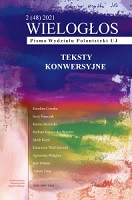Alborada iberyjska. Kobieca pieśń spotkania o świcie, XI–XVII wiek
Iberian Alborada. Feminine Song of a Meeting at Dawn, 11th-17th Century
Author(s): Grażyna Urban-GodziekSubject(s): Middle Ages, 16th Century, 17th Century, Theory of Literature
Published by: Wydawnictwo Uniwersytetu Jagiellońskiego
Keywords: poetry - genre classification; alborada; women’s songs; kharja; cantiga de amigo; villancico;
Summary/Abstract: The aim of the article is to define the genre of alborada, referring to its oldest Iberian forms, Mozarabic and Portuguese, and showing its evolution in early modern Castilian poetry. This study will therefore serve as a basis for outlining the genre, which was also present in other European literatures, i.a. Polish literature from the Renaissance to Romanticism. Iberian songs discussed here display a clear structure established in a long tradition and exploit the theme of lovers meeting at dawn, originating in folk tradition and implemented in medieval formal courtly genres of kharja, cantiga de amigo (examples of Pero Meogo and Dom Dinis) as well as in 15th-century villancico. It also entered other genres, most prominently sonnets, during the Renaissance. These multiple formal changes resulted in a gradual evolution of the lyrical subject of the alborada – the original complaint of a girl in love, a girl who is active and fighting for her happiness, has been transformed into a song of adoration and regret of a he-lover who at night serenades a lady who is mute and confined to the frame of her window. By this token, the history of the lyrical genre reflects the gradual removal of women’s voices and stripping them of their agency.
Journal: Wielogłos
- Issue Year: 2021
- Issue No: 49
- Page Range: 1-30
- Page Count: 30
- Language: Polish

